The Saint of the Day
 |
 |
 |
 |
 |
 |
 |
St. Corbinian – September 8
Biographical selection:
St. Corbinian, a Frankish Bishop, died on September 8, 730, in Bavaria.
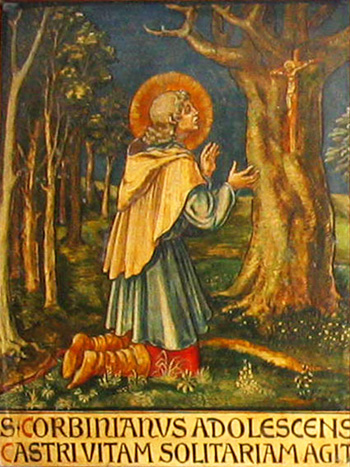
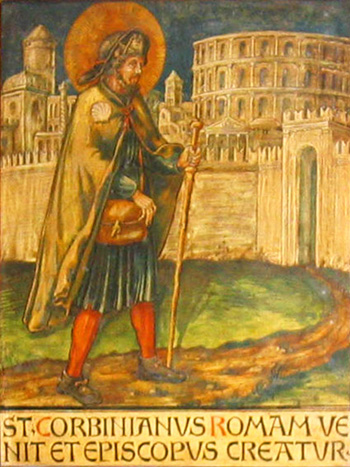 After living as a hermit near Chartres for 14 years, he made a pilgrimage to Rome where he met Pope Gregory II, who sent him to the Duchy of Bavaria to evangelize it.
After living as a hermit near Chartres for 14 years, he made a pilgrimage to Rome where he met Pope Gregory II, who sent him to the Duchy of Bavaria to evangelize it.
Arriving at its borders in 724, St. Corbinian was stopped by soldiers of Duke Grimoald. They had been ordered to not allow the Bishop to pass until he had presented himself to the Duke. The Saint agreed. But, en route he declared that he only would enter the Duke's castle if Grimoald would leave the widow of his brother, whom he had married.
When the Duke refused, St. Corbinian did not relent and continued to admonish the noble for his incest. After 40 days, Grimoald and his wife promised to separate; the Bishop received them and absolved them after they asked forgiveness on their knees and kissed his feet. As penance, he imposed the giving of alms, fasting and prayers. Only then did he enter the Duke's castle.
Another time, seated at the Duke's table, he blessed the food. The noble, distracted, threw a piece of the food to his favorite dog. Immediately, the Holy Man stood up, kicked over the table laden with food, and declared that one who would throw blessed food to a dog was unworthy of the blessing. Further, he declared that from that day forward he would not eat with the Duke.
The Duke, who held the Saint in great esteem, ordered the gates of the city to be closed, fearing that in his wrath the Man of God would leave it. Then, accompanied by the highest nobles of his court, he went to ask his forgiveness.
On another occasion, returning from praying the office in the Church of Saint Mary, the Holy Bishop met a peasant woman who was carrying many gifts. She was known as a woman who practiced witchcraft. He asked her where she had received those many gifts. She replied that she had cured the son of the Duke who was being tormented by the Devil.
Horrified, the Bishop descended from his horse and beat the woman with his own hands. He took from her those packages and gave everything to the poor at the entrance gate of the city.
Comments of Prof. Plinio:
We defend the position that any virtue that is practiced unilaterally is not virtue. If we were to imagine a saint who was very soft, good, amiable etc. on every occasion in life, we would not be in the presence of a saint.
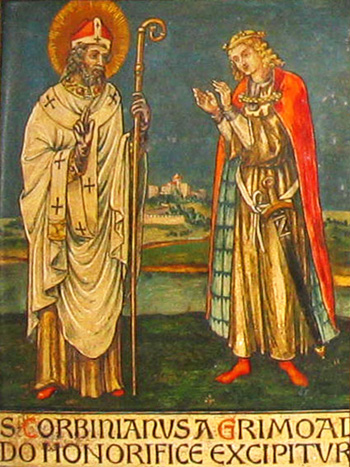 Also, if we were to imagine a saint who always would react explosively as St. Corbinian did in these episodes, we would be in presence of a very singular saint. For we cannot imagine a Bishop who, as a remedy for every situation, would overturn tables with food and beat women in the street. But there are situations where it is a duty to act in this way, just as on other occasions one should act in the opposite way.
Also, if we were to imagine a saint who always would react explosively as St. Corbinian did in these episodes, we would be in presence of a very singular saint. For we cannot imagine a Bishop who, as a remedy for every situation, would overturn tables with food and beat women in the street. But there are situations where it is a duty to act in this way, just as on other occasions one should act in the opposite way.
What can be said about this example of St. Corbinian? Today we have many examples of virtue practiced in the opposite way, with the soft and amiable approach. The Corbinian virtues, so to speak, are extraordinarily rare to find in today's Hierarchy – except when the present day Bishops attack us. Thus, we would like to see more of the Corbinian way in the Bishops toward error, and a little more affability in the treatment of people in his time. This provides a point to comment upon in this selection.
This brings to mind a forgotten truth: that is, Saints should be like St. Corbinian in certain situations of their lives. This pertains to situations of the past as well as the present . Now, our epoch is one of such hardness and obstinacy in sin – the worst of which is the sin of Revolution, the worst of the heresies – that we do not know what to say. It is clear that to overcome this obstinacy the remedy in many cases must be harshness.
The first episode of St. Corbinian – his behavior with the Duke and his wife – can be explained by the fact that the Duke was married to his brother's widow. The selection does not mention but we should suppose that husband and wife were close relatives and did not have dispensation of the Church for that, which would constitute the crime of incest. Given that he was a high noble, only the Holy See could give a dispensation for such marriages. He had not asked for this dispensation and was living with her in an illicit marriage. Therefore, he was in a situation that the Bishop could not tolerate.
You saw how severely he censured the Duke for his action and the strong humiliation he exacted from the noble as a condition for forgiveness.
Who would be the equivalent of that powerful noble today? Most of the nobles of out times no longer have such great power and wealth. The Revolution passed those goods to others. To confront the nobles would not be a proof of courage for a Saint Bishop of our days.
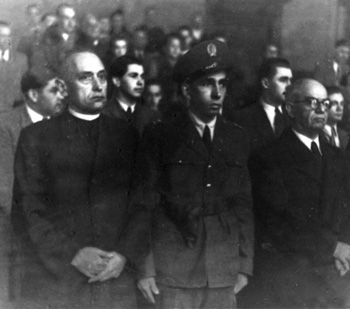 A similar proof of courage today would be for a Bishop to face not only those with extreme wealth, but also the media giants in the press, radio and television and institutions that model
public opinion, the demagogues, the leaders of the revolutionary currents. Those are the ones whom a Bishop should confront.
A similar proof of courage today would be for a Bishop to face not only those with extreme wealth, but also the media giants in the press, radio and television and institutions that model
public opinion, the demagogues, the leaders of the revolutionary currents. Those are the ones whom a Bishop should confront.
But how beautiful it is to see a Bishop facing Communism and the Revolution! An example no less beautiful than St. Corbinian's strong reactions is that of Card. Mindzenty, who is a prisoner in Hungary [N.T.: these comments were made in September 1969].
An enormous silence has fallen over the heroic Cardinal to the point that it is almost forgotten that he still exists. The latest news is that he has two small rooms in the American Embassy in Budapest. He is a type of prisoner there when he should be treated as a Prince. This is an example of an extraordinary fortitude that reminds us of St. Corbinian.
Then there is the episode where he overturned a table because the noble gave some food blessed by the Saint to the dog. Someone could say that he should not have acted so violently. He could have said: "Duke, do you not think it is too much to give blessed bread to a dog?" Would this not have better won the sympathy of the noble?
Let us remember that the primary aim of the art of dealing with people is not just to create sympathy, but to instill respect. Napoleon terrified Europe and was deeply respected; the English Empire instilled fear and was respected. The United States tried to conquer the world with money, liberty and smiles and did not win the respect of the peoples.
Certainly the smile has a role in life. But one who adopts the smile as the royal path to conquer makes a mistake. The smile must be tempered with acts of great energy and value that raise fear. For this reason, we have a Saint who undoubtedly had an enormous goodness, but who knew how to raise fear in the Duke to gain his respect.
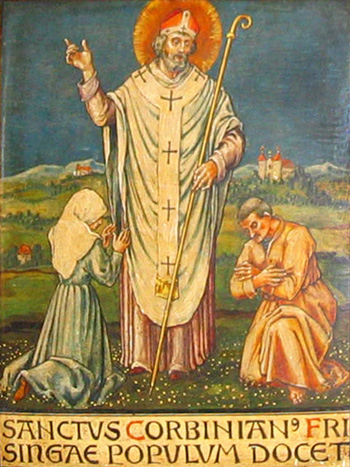 The position of that noble was also marvelous. His contrition was charming. He made a mistake with the dog and the Saint gave him a stern admonition. What was his first reaction? To close the gates of the city so that the Saint would not leave it and so that he could ask forgiveness.
The position of that noble was also marvelous. His contrition was charming. He made a mistake with the dog and the Saint gave him a stern admonition. What was his first reaction? To close the gates of the city so that the Saint would not leave it and so that he could ask forgiveness.
How much contrition there is in this decision! And how much innocence! Is it not true that even in the penance there is an innocence that far outweighs the fault he committed? This is what leaves us in wonder.
Finally, there is the beating of the woman, who was a type of witch. She used some spell to cure the son of the Duke.
Are there similar cases today? Two days ago, I was reading about an inauguration of a municipal park here in São Paulo where an ecumenical encounter took place. The Catholic Bishop spoke, then a spiritist, followed by a rabbi etc.
Now then, a spiritist is a man who is in frequent contact with devils. This man was present at the ceremony and the Bishop treated him as an equal. The spiritist is like that witch who was beaten by St. Corbinian. Where can a Bishop be found today who follows the example of St. Corbinian?
How things have changed! How everything paled after the Constantinian Church started to fade! We cannot say that we have nostalgia for her, because she still lives in us. Thus, we have the continuous joy of belonging to her.


The Saint of the Day features highlights from the lives of saints based on comments made by the late Prof. Plinio Corrêa de Oliveira. Following the example of St. John Bosco who used to make similar talks for the boys of his College, each evening it was Prof. Plinio’s custom to make a short commentary on the lives of the next day’s saint in a meeting for youth in order to encourage them in the practice of virtue and love for the Catholic Church. TIA thought that its readers could profit from these valuable commentaries.
The texts of both the biographical data and the comments come from personal notes taken by Atila S. Guimarães from 1964 to 1995. Given the fact that the source is a personal notebook, it is possible that at times the biographic notes transcribed here will not rigorously follow the original text read by Prof. Plinio. The commentaries have also been adapted and translated for TIA’s site.
St. Corbinian, a Frankish Bishop, died on September 8, 730, in Bavaria.

St. Corbinian, a hermit for 14 years, travels to Rome & receives the mission to evangelize Bavaria

Arriving at its borders in 724, St. Corbinian was stopped by soldiers of Duke Grimoald. They had been ordered to not allow the Bishop to pass until he had presented himself to the Duke. The Saint agreed. But, en route he declared that he only would enter the Duke's castle if Grimoald would leave the widow of his brother, whom he had married.
When the Duke refused, St. Corbinian did not relent and continued to admonish the noble for his incest. After 40 days, Grimoald and his wife promised to separate; the Bishop received them and absolved them after they asked forgiveness on their knees and kissed his feet. As penance, he imposed the giving of alms, fasting and prayers. Only then did he enter the Duke's castle.
Another time, seated at the Duke's table, he blessed the food. The noble, distracted, threw a piece of the food to his favorite dog. Immediately, the Holy Man stood up, kicked over the table laden with food, and declared that one who would throw blessed food to a dog was unworthy of the blessing. Further, he declared that from that day forward he would not eat with the Duke.
The Duke, who held the Saint in great esteem, ordered the gates of the city to be closed, fearing that in his wrath the Man of God would leave it. Then, accompanied by the highest nobles of his court, he went to ask his forgiveness.
On another occasion, returning from praying the office in the Church of Saint Mary, the Holy Bishop met a peasant woman who was carrying many gifts. She was known as a woman who practiced witchcraft. He asked her where she had received those many gifts. She replied that she had cured the son of the Duke who was being tormented by the Devil.
Horrified, the Bishop descended from his horse and beat the woman with his own hands. He took from her those packages and gave everything to the poor at the entrance gate of the city.
Comments of Prof. Plinio:
We defend the position that any virtue that is practiced unilaterally is not virtue. If we were to imagine a saint who was very soft, good, amiable etc. on every occasion in life, we would not be in the presence of a saint.

Duke Grimoald takes a position of respect and humility before the Bishop
What can be said about this example of St. Corbinian? Today we have many examples of virtue practiced in the opposite way, with the soft and amiable approach. The Corbinian virtues, so to speak, are extraordinarily rare to find in today's Hierarchy – except when the present day Bishops attack us. Thus, we would like to see more of the Corbinian way in the Bishops toward error, and a little more affability in the treatment of people in his time. This provides a point to comment upon in this selection.
This brings to mind a forgotten truth: that is, Saints should be like St. Corbinian in certain situations of their lives. This pertains to situations of the past as well as the present . Now, our epoch is one of such hardness and obstinacy in sin – the worst of which is the sin of Revolution, the worst of the heresies – that we do not know what to say. It is clear that to overcome this obstinacy the remedy in many cases must be harshness.
The first episode of St. Corbinian – his behavior with the Duke and his wife – can be explained by the fact that the Duke was married to his brother's widow. The selection does not mention but we should suppose that husband and wife were close relatives and did not have dispensation of the Church for that, which would constitute the crime of incest. Given that he was a high noble, only the Holy See could give a dispensation for such marriages. He had not asked for this dispensation and was living with her in an illicit marriage. Therefore, he was in a situation that the Bishop could not tolerate.
You saw how severely he censured the Duke for his action and the strong humiliation he exacted from the noble as a condition for forgiveness.
Who would be the equivalent of that powerful noble today? Most of the nobles of out times no longer have such great power and wealth. The Revolution passed those goods to others. To confront the nobles would not be a proof of courage for a Saint Bishop of our days.

Card. Mindzenty, at left, at his mock trial held by the Communists
But how beautiful it is to see a Bishop facing Communism and the Revolution! An example no less beautiful than St. Corbinian's strong reactions is that of Card. Mindzenty, who is a prisoner in Hungary [N.T.: these comments were made in September 1969].
An enormous silence has fallen over the heroic Cardinal to the point that it is almost forgotten that he still exists. The latest news is that he has two small rooms in the American Embassy in Budapest. He is a type of prisoner there when he should be treated as a Prince. This is an example of an extraordinary fortitude that reminds us of St. Corbinian.
Then there is the episode where he overturned a table because the noble gave some food blessed by the Saint to the dog. Someone could say that he should not have acted so violently. He could have said: "Duke, do you not think it is too much to give blessed bread to a dog?" Would this not have better won the sympathy of the noble?
Let us remember that the primary aim of the art of dealing with people is not just to create sympathy, but to instill respect. Napoleon terrified Europe and was deeply respected; the English Empire instilled fear and was respected. The United States tried to conquer the world with money, liberty and smiles and did not win the respect of the peoples.
Certainly the smile has a role in life. But one who adopts the smile as the royal path to conquer makes a mistake. The smile must be tempered with acts of great energy and value that raise fear. For this reason, we have a Saint who undoubtedly had an enormous goodness, but who knew how to raise fear in the Duke to gain his respect.

St. Corbinian teaching the doctrine of the Faith to the simple people
How much contrition there is in this decision! And how much innocence! Is it not true that even in the penance there is an innocence that far outweighs the fault he committed? This is what leaves us in wonder.
Finally, there is the beating of the woman, who was a type of witch. She used some spell to cure the son of the Duke.
Are there similar cases today? Two days ago, I was reading about an inauguration of a municipal park here in São Paulo where an ecumenical encounter took place. The Catholic Bishop spoke, then a spiritist, followed by a rabbi etc.
Now then, a spiritist is a man who is in frequent contact with devils. This man was present at the ceremony and the Bishop treated him as an equal. The spiritist is like that witch who was beaten by St. Corbinian. Where can a Bishop be found today who follows the example of St. Corbinian?
How things have changed! How everything paled after the Constantinian Church started to fade! We cannot say that we have nostalgia for her, because she still lives in us. Thus, we have the continuous joy of belonging to her.

 | |
|
|
The texts of both the biographical data and the comments come from personal notes taken by Atila S. Guimarães from 1964 to 1995. Given the fact that the source is a personal notebook, it is possible that at times the biographic notes transcribed here will not rigorously follow the original text read by Prof. Plinio. The commentaries have also been adapted and translated for TIA’s site.


